2024 - 2
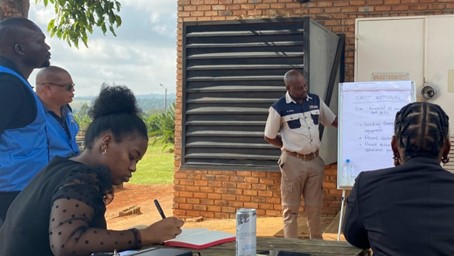
Dear Readers,
Another three months have passed and a lot has happened in the Blue Deal. The WISA conference in Durban was a moment to reap the results of our efforts. Where shall we start?
The Dutch ambassador, Joanne Doornewaard, opened the WISA 2024 Blue Deal workshop where we exchanged lessons learned between the partnerships of South Africa, eSwatini and Mozambique. Special attention was paid to the position of women in the water sector, also a relevant issue in the Netherlands. Importantly, the royal visit is a recognition of the good work done by the Blesbokspruit local team and its partnersthe South Africa – Netherlands Joint Steering Committee gathered to discuss the progress of all water-related collaboration between our countries, under the inspiring leadership of DG Sean Phillips of the Department of Water and Sanitation (DWS) and the Dutch ambassador.
Another important event at WISA was the official launch of two new Catchment Management Agencies: PUCMA (Pongola-Umzimkulu) and VOCMA (Vaal-Orange).
Minister Senzo Mchunu came to Durban to personally launch this major milestone. The MTCMA (Mzimvubu-Tsitsikamma) and LOCMA (Limpopo-Olifants) will follow soon.
IUCMA (Inkomati-Usuthu) and BOCMA (Breede-Olifants) were already established in the past. (Yes, we love CMA abbreviations…) The Dutch Water Authorities (DWA) are proud to have contributed to the CMA establishment process, and look forward with enthusiasm to bi-directional learning collaborations with the CMAs into the future.
There is much to tell about the five local Blue Deal projects as well, please read this newsletter to find out more. In June 2024, the Blue Deal National Steering Committee was hosted by the Netherlands Embassy, and informed all partners as to the about the progress and challenges during a live meeting in Pretoria. The national partners – DWS, WRC, SALGA and CoGTA/MISA - agreed to have a digital follow-up per project to strengthen their project specific support.
A lot of small steps contributing to progress within one big movement. We continue steadily; after all water management is a long term challenge.
With kind regards,
Eustathia Bofilatos (DWS Director of Institutional Oversight, South Africa)
Marion Wierda (DWA Chief Executive Blue Deal South Africa, The Netherlands)
Blue Deal Crocodile River Partnership continues to make strides towards quality water in the Crocodile River
The Blue Deal Crocodile River Partnership continues its collaborative efforts to enhance the quality of water and sustainability in the Crocodile River in the Mpumalanga Province. Comprising a diverse coalition of partners, their mission focuses on optimising six wastewater treatment facilities along the Crocodile River.
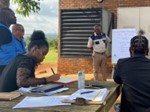
Read more
Milestone during WISA: Establishment of Catchment Management Agencies
From June 12th to 14th, the WISA conference took place in Durban, South Africa. This three-day water management congress for Southern Africa had the theme “Turning the Tide.” As part of the Blue Deal initiative, we achieved the following:
- Conducted workshops on Blue Deal collaborations, including a workshop on “Women in Water” in partnership with the World Water Academy.
- Participated in the Wet Skills competition. Our Blue Deal team presented a case study, and four students from around the world delivered their final presentations during WISA.
- Managed a joint booth with the Department of Water and Sanitation, where we connected with stakeholders during breaks.
- Held meetings and established agreements with the Dutch ambassador and the Minister of Water and Sanitation in South Africa (joint Steering Committee).
- And much more!
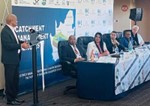
Memorable Moment: Establishment of Catchment Management Agencies
A significant and memorable moment was the official launch of waterschappen / Catchment Management Agencies (CMAs)) in South Africa. Over the past years, we’ve shared our experiences related to water resource management tasks, which contributed to thee establishment of CMAs in South
Africa. Marion Wierda, CEO of Blue Deal South-Africa, played a crucial role alongside the minister and other dignitaries during this inaugural event. We highlighted the 750-year history of Dutch water boards.
.
Previously, CMA responsibilities in South Africa were scattered across provinces and ministries. By creating these waterschappen, also known as Catchment Management Agencies (CMAs), we emphasize the importance of clean, sufficient and safe water. CMAs enable local, responsible management of water-related challenges. Together, we’re working towards resilient water management! More information?
Read more
How to eat an elephant? Blesbokspruit work visit June 2024
The Blue Deal Blesbokspruit programme is characterized by three significant and yet very different and overlapping challenges: removing water hyacinth, improving water quality, and enabling job creation. It turns out to be a complex project with different tasks and responsibilities, making it difficult to prioritize and especially as to how to convert challenges into opportunities. Conducting interviews with the separate partner and interested and affected committees linked to this, a renewed stakeholder analysis has provided new and refreshed insights.

The set goals and activities were then evaluated in a team session
It has been almost unanimously concluded that we are largely on the right track with the formulated activities. A key component here is the need for data, the interpretation of the data into information, and the sharing and workshopping
thereof to arrive at agreed and prioritized guiding actionables. The new short term future focus is therefore on collecting and providing insights into the existing data that is spread across the various parties. Included in the visit by the Dutch team was a visit to an active gold mine, providinginsight into production process and the treatment of process water.
Smart land and water resource management: co-creating a collaborative opportunity
Smart land and water resource management.pdfThe Blue Deal Programme has taken steps to be more conscious of climate change in all the work that is being done to meet the 2030 goals. This effort is most seen in the inclusion of the KIWI Climate Game Changers to the programme.
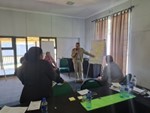
Read more
Working visit Msunduzi Umgeni River and WISA 2024: a fortuitous and rewarding combination
The working visit by Dutch colleagues had the opportunity to combine with WISA 2024, and this opportunity proved to be an excellent combination. Besides WISA and the contacts we made there, we visited Adopt a River projects together with the Dutch ambassador. The Blue Deal Msunduzi-Umgeni River project team were able to show during multiple partner and stakeholder engagements as to how important this project is for the greater Durban area, both during the working visit and also at a high level reception later that week. And then also connect various relations to contribute to the project's objectives.
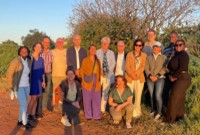
More Blue Deal Msunduzi-Umgeni River project project highlights:
- We had a meeting with eThekwini Municipality on the functioning of early warning systems in the catchment. During the previous work visit it became clear that a lot of organisations (including eThekwini Municipality, uMngeni-uThukela Water, DWS) are creating and maintaining their own kind of (community based) early warning systems. The Blue Deal goal is to align all these efforts on early warning systems to work efficiently and effectively to prevent socio-economical catastrophes and save lives where possible.
- We also spent time during the work visit to prepare the workshops that are scheduled for the work visit in October 2024. Together with the UEIP and stakeholders from the Water Research Committee (WRC) and WWF we concluded to support local needs by organizing workshops on climate change & adaptation, and on proposal writing, and on. The workshops are aimed at supporting young professionals in the organizations Blue Deal is partnering with. The workshops will hopefully contribute to a healthy Msunduzi-Umgeni River
Contract signed for cleaning solid waste in Villiersdorp
The Theewaterskloof Local Municipality has recently appointed a contractor to clean the streets in the informal settlements of Villiersdorp. This includes the important streams and wetlands in Villiersdorp, which all ultimately drain in to the City of Cape Town’s single largest fresh water reservoir, Theewaterskloof Dam. The contractor has started immediately.
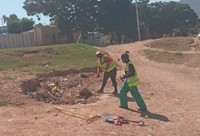
This is an important step for the Blue Deal Theewaterskloof project of which the Theewaterskloof Local Municipality is a key and leading local partner. The goals of the Blue Deal Theewaterskloof project are:
- To improve the sanitation services in informal settlements (piloted at the town of Villiersdorp)
- To diminish solid waste pollution of the environment (piloted at the town of Grabouw).
Reaching goals 1 and 2 through community enrolment, and in a community beneficial manner which accesses and supports the circular economy approach.
This was a great contribution to 2024; we will have more goals to achieve and share in the coming months!
Exciting next steps after our Climate Adaptation Webinar of March 2024
With a nod to the organizers, notably Ms. Yota Mingo of the Dutch Water Authorities, Ms. Minenhle Nene of the Netherlands Embassy, and Dr John Dini of the WRC, during March 2024, Blue Deal hosted an excellent webinar on Climate Adaptation. This well attended webinar shared insights from local projects and national and international specialists.


Dear Reader,
We are coming close to the end of the year 2023. Looking back on the last few months we can be proud of the work that has been done, our progress made and the many positive impacts achieved. Many thanks to all involved.
In October, the Blesbokspruit project was honoured with the visit of King Willem-Alexander and Queen Máxima from the Netherlands as part of their state visit. It was hectic and exciting. But above all, the royal visit is a recognition of the good work done by the Blesbokspruit local team and its partners. And a booster for the future.
There were highlights in the other Blue Deal projects as well.
A delegation from Theewaterskloof Municipality attended the first International Water Association Non-Sewered Sanitation Summit. Pilots with innovative technologies will be started in our project area.
The project in KwaZulu-Natal has reviewed its plans for phase 2. It now has a focus on improving climate resilience in the Msunduzi-uMngeni catchment area.
In Vredefort Dome an assessment of the impact of climate change was started to help secure the UNESCO status. Climate change is also the theme of the Blue Deal webinar that will be held in February/March 2024.
Under the leadership of CoGTA and IUCMA, the Crocodile River local project hosted the milestone first annual Blue Deal Crocodile River ‘MOU Oversight Committee’ event.
Blue Deal South Africa participated in the biennial REMCO conference on transboundary water management. Important steps have been made regarding data management with the water authorities and Blue Deal partnerships in eSwatini and Mozambique. The discussion on women and youth in the water sector was inspiring and will be continued during the WISA conference next year. And what a joy to see our Young Expert Professionals (YEP’s) contributing at the conference.
On a programme level the annual plan for 2024 has been established. And last but not least, we can celebrate the appointment of the Boards for the Pongola/Umzimkhulu and the Vaal Orange Catchment Management Agencies by cabinet, a milestone for the South African water sector.
Please enjoy reading this newsletter. We wish you a Merry Christmas and a happy and healthy New Year for yourselves and your dear ones. And we look forward to continue our inspiring collaboration next year.
With kind regards,
Marion Wierda (DWA Chief Executive Blue Deal South Africa, The Netherlands)
Eustathia Bofilatos (DWS Director of Institutional Oversight, South Africa)
PS. Feel free to forward this newsletter to someone who might be interested!


Royal visit for Blue Deal project Blesbokspruit
His Majesty the King of the Netherlands and Her Majesty Queen Máxima were proudly received at the Blesbokspruit wetland on October 18, in the presence of Mr Senzo Mchunu, Minister of Water and Sanitation.
The visit by the King and the Queen focused on many aspects, including the cooperation between South Africa and Netherlands on water management. The Majesties visited the wetland and engaged with representatives of the Blue Deal project, local entrepreneurs and Wetskills alumni.
Read the press release of the Department of Water and Sanitation.

Zama Ngcobo, Young Expert Professional: ‘It’s all about turning problems into creative solutions’
During the state visit of the royal couple to South Africa, Ms Zama Ngcobo, one of our Blue Deal South Africa Young Expert Professionals, guided the royal couple through recent developments in the Blue Deal Blesbokspruit project, one of the five Blue Deal South African local projects.
Read the interview she gave to the Dutch Ministry of Foreign Affairs.

Blue Deal webinar on Climate Adaptation
Get ready for an upcoming Blue Deal webinar on Climate Adaptation! We're addressing climate change's impact on South Africa and the Netherlands, especially in water-related challenges. In February-March 2024 we'll discuss policy insights, real-life consequences and best practices. The exact date will be announced soon, so stay tuned for more details. Open to everyone.

Interview: Jan van Staden of Breed Olifants Catchment Mangement Agency (BOCMA)
Please tell the readers about yourself and BOCMA and how you and BOCMA are involved in the Blue Deal South Africa Partnership.
I am Jan van Staden, the acting CEO of the BOCMA. Recently we signed a Blue Deal local project MOU with key local role players of the Theewaterskloof region. This MOU gives structure to the Theewaterskloof Blue Deal project. Since the Theewaterskloof local municipality falls within the management area of the BOCMA, it made perfectly sense to get involved with the Blue Deal, as some of the objectives of the project are aligned with that of the BOCMA. An example of this is the reduction of surface water pollution emanating primarily from rapidly increasing Informal Settlements.
What do you like most about the Blue Deal Partnership? Please, give an example.
The fact that the project could be tailor-made to suit specific areas. In the case of the TWK project, it identified the need for collaboration with critical stakeholders very early in the process. The very same collaboration has led to the identification of two community based “seedlings of hope” from within the informal settlements. These seedlings of hope are low hanging fruits, enabling communiity enrolement as co-management of the Blue Deal within the towns of Villiersdorp and Grabouw. Even though the TWK project mainly focuses on Informal Settlements, the assistance and acknowledgment of commercial agriculture, industry, the environment and most importantly, faith based groupings including the church, have been prioritized to achieve maximum output.
What is your BHAG (Big Hairy Audacious Goal) for the Blue Deal South Africa collaboration? And what, do you think, is the most critically important first step towards this ambition?
To have meaningful impact on people and the environment. For the Blue Deal TWK project, this would mean that people within Informal Settlements should have a voice and an effective communication channel, culminating in peaceful, cooperating communities, in sync with the goals and objectives of the TWK municipality and other stakeholders. Another goal is the improvement of the water quality around the TWK dam, as well as reduction of solid waste pollution within the town of Grabouw.
To achieve this, the first step would be to acknowledge that communities vary, and that the immediate needs for such communities may vary too. Therefore, building solid relations with communities through the so-called ‘gatekeepers’ may provide the critical linkage between the project lead and the community.
Is there anything else that you would like to share with us?
I hope that tangible output can be achieved with this project. The BOCMA remains committed to the goals and objectives of the project and would like to see meaningful change happening in TWK municipal area, which could be rolled out to other areas too.

REMCO conference: transboundary cooperation is a must
In November the 7th REMCO conference was hosted in Mbabane by the eSwatini colleagues. REMCO stands for River and Environmental Management COoperation. This is a biennial meeting around transboundary water management in Mozambique, eSwatini and South Africa. These countries share the Maputo and Inkomati river basins. Climate change impacts the region through the greater frequency and severity of floodings and droughts. In order to meet these growing challenges, transboundary cooperation is a must.
This conference had a focus on improving collaboration on operational water management challenges. Topics discussed included:
- the participation of women and youth
- data management and exchange
- and the importance of water for a growing economy and vibrant communities (agriculture, tourism, industry, energy, etc).
The Blue Deal teams of all three countries participated. Representatives of the Dutch Water Authorities were present to support, learn and discuss. Professor Herman Havekes gave a presentation on Dutch water governance. Other Dutch colleagues shared their experience and knowledge as to how transboundary water management with Germany and Belgium is important for the Netherlands as well.

My REMCO Experience
By Angel Mgwenya, Young Expert Professional (YEP)
'The REMCO Conference was an opportunity to bring together delegates from South Africa, Mozambique, Germany, the Netherlands as well as Eswatini, to engage on transboundary governance.
Day 1 of the conference kicked off with the 4th Inkomati Basin Women & Youth in Water Conference. The day highlighted not only the importance of youth and women in water but also in addressing the large gaps that still exist in the inclusion of youth and women in water governance.
The remainder of the conference was an exceptional example of transboundary governance and cooperation. Interweaved in the technical display of the work done, was the storytelling of the success and hardships of communities that are beneficiaries of the water and the land. These stories brought together the importance and the effect of the work and research undertaken to promote the provision of clean, safe and sustainable water to the larger shared catchment.
The conference was a brilliant opportunity for the personal and professional development of the YEP’s. The event further promoted shared knowledge and expanding networks that will lead to renewed and stronger relationships within the REMCO community.'

Navigating achievements and challenges: insights into the Blue Deal Crocodile River Partnership’s progress in the journey to Green Drop Certification
A recent important chapter unfolded for the Blue Deal Crocodile River Partnership during the November 2023 work visit in Mpumalanga, South Africa, emphasising sustainable wastewater treatment.
the Blue Deal Crocodile River Memorandum of Understanding. This newly established committee creates a platform where the progress made by the partnership is formerly reported to the Heads of partner institutions. This latest development is also significant progress in ensuring buy-in and support for the Blue Deal Crocodile River Partnership program by the leadership of the partner institutions. In the future, the meetings of the Oversight Committee will sit annually to appraise the progress made by the Blue Deal Crocodile River Partnership program.
During this work visit, the Blue Deal Crocodile River Memorandum of Understanding “Oversight Committee” was formally established, and its inaugural meeting was hosted on 16 November. The Oversight Committee is comprised of the heads of all partner institutions that are signatories to the Blue Deal Crocodile River Memorandum of Understanding. This newly established committee creates a platform where the progress made by the partnership is formerly reported to the Heads of partner institutions. This latest development is also significant progress in ensuring buy-in and support for the Blue Deal Crocodile River Partnership program by the leadership of the partner institutions. In the future, the meetings of the Oversight Committee will sit annually to appraise the progress made by the Blue Deal Crocodile River Partnership program.
The support from the Head of Department (HOD) at the Department of Cooperative Governance and Traditional Affairs (CoGTA) is deeply valued. The HOD CoGTA has accepted the role of Chairing the newly established Oversight Committee. His guidance and support directly assisted in the hosting of the committee's inaugural meeting.
Inaugural Oversight Committee meeting: progressing towards Green Drop Certification
During the inaugural meeting, each task team reported progress through the lense of the Department of Water and Sanitation’s Green Drop certification for the participating Wastewater Treatment Works (WWTWs). The Water Quality and Data-sharing Task Team presented a detailed examination of wastewater treatment plant discharge, emphasising the need for thorough data compliance and as to how the same would improve Green Drop scoring. Communication and intergovernmental relations Task Team reported significant strides, with a recognisable partnership logo symbolising its growing presence. The Technical Capacitation and Wastewater Treatment Works Optimisation Task Team set stretching targets for annual improvements in Green Drop scoring such as to ensure Green Drop certification by 2030. The Business Planning and Finances Task Team highlighted the key importance of business planning and finance in support of enabling WWTWs performance, and hence Green Drop certification.
Projections anticipate significant Green Drop Score improvements across the various WWTWs locations of the partner Municipalities (Mbombela LM, Nkomazi LM, and Emakhazeni LM), emphasising the partnership's concerted efforts. A key recommendation proposed and adopted by the Blue Deal Crocodile River Partnership is to establishi ring-fencing of municipal budgets for the respective WWTWs, and most especially as regards operation and maintenance.
Harnessing Collective Learning Power: who is your buddy?
Internationally, the collaboration includes a peer learning"buddying" approach for exchanging wastewater treatment expertise and experiences between Dutch and South African WWTWs superintendents. The partnership’s “buddying” is embarking on a structured programme of collective peer learning, fostering a dynamic environment of reciprocal exchange both amongst South African Blue Deal municipalities, and also internationally with the Dutch Water Authorities.
In conclusion, all parties have agreed that whilst early indications are that progress is promising, unwavering commitment is crucial. The Blue Deal Crocodile River Partnership Oversight Committee will serve as a sentinel, providing an accounting platform for annual feedback and progress reporting to signatories of the Memorandum of Understanding.

Theewaterskloof: first International Water Association Non-Sewered Sanitation Summit
A delegation from Theewaterskloof Municipality attended the first International Water Association Non-Sewered Sanitation Summit. The Summit, which was co-hosted by the Water Research Commission, was held in Johannesburg.
It was an ideal opportunity to kick-start the local Blue Deal Theewaterskloof project. This project seeks to be an incubator for innovative sanitation technologies in rapidly growing, unplanned, informal settlements via a community enrolment driven process. The attendees included both management and technical staff, and a community representative.

Dear readers,
Water flows and time flies… Another three months have passed and a lot has happened in the Blue Deal South Africa. You can read all about it in this newsletter. Let us highlight two major events.
The #CoCreateMyCity summit in Durban had a high turnout of people and organisations
This lead to valuable networking, discussions and ideas. There was great commitment to address challenges and to do this in a collaborative manner. Very importantly, considering the serious situation in Durban, both flood risk reduction and improvement of water quality were noted as urgently requiring attention. The Dutch will also join forces in the collaboration: World Water Academy, Wetskills and Blue Deal South Africa will all contribute. The way forward is being drafted now; plans and first results will presented during the WISA 2024 conference in Durban.
Another big event was the Blue Deal congress in Amsterdam
Delegations from all 15 Blue Deal countries came together for a worldwide exchange amongst professionals. This first congress in the history of the Blue Deal was a great success. It turns out that water challenges are very much the same across other countries, so the Blue Deal family can learn a lot from each other. For instance, Burkina Faso solves the water hyacinth problem by making compost, and in the Palestinian Territories they have developed a mobile waste water treatment system for small informal settlements. Windows of opportunity for our projects in South Africa? We will explore it in follow-up interactions. We hope you enjoy reading this newsletter. And that it triggers cooperation, co-creates new ideas and keeps us inspired with the Blue Deal magic!
With kind regards,
Marion Wierda (DWA Chief Executive Blue Deal South Africa, The Netherlands)
Eustathia Bofilatos (DWS Director of Institutional Oversight, South Africa)
PS. Feel free to forward this newsletter to someone who might be interested!


Connie Georgina Kweleta
With great sadness the Blue Deal South Africa family has received the sad news about the passing of Mrs Connie Georgina Kweleta, Town Manager of Villiersdorp. A great loss and an enormous shock for Connie’s family, friends, colleagues and Blue Deal South Africa.
Connie was one of the dynamic inspirations behind the Blue Deal Theewaterskloof project, and soon became a driving force in the setting up thereof Connie was a truly inspirational contributor to the earliest discussions and vision for a possible new Blue Deal project in the Theewaterskloof catchment area – be those discussions with her local community, the Dutch team, or discussions at Bishopscourt with multiple parties as to the role that can faith play in giving hope. From the very beginning Connie’s enthusiasm, dedication and inspirational energy were noticeable and motivated many others around her. Her dedication to the community enrolment and upliftment focus of the project was exceptional and guiding in the design and approach to the Blue Deal Theewaterskloof project. Although Connie was already ill, she made sure to give priority to this initiative.
With Connie we lose a highly respected and committed colleague who was full of ambition to enable and empower the upliftment of those special “seedlings of hope” initiatives in the informal settlements of both Villierdorp and Grabouw. A dynamic and warm person, and accessible to everyone.
Our thoughts and prayers are most especially with Connie, her husband and children. We wish them a lot of strength. Connie, you will forever inspire the Blue Deal Theewaterskloof programme.
 Schools as key stakeholders of Blue Deal
The Blue Deal Blesbokspruit project is characterised by contradictions. These RAMSAR status wetlands are overgrown by water hyacinth, an exotic invasive plant that is almost unstoppable. Controlling water hyacinth requires a drastic improvement in water quality. On the other hand, the plant is also seen as an opportunity for economic growth i.e. a business opportunity.
Local and international companies are looking at means by which to commercially beneficiate the water hyacinth plant and to take these opportunties to market. It is precisely these contradictions and potential solutions and opportunities that were presented by the City of Ekurhuleni to some 40 students from some primary schools in the immediate vicinity of the wetlands. They clearly depicted the issues with remarkable detail explaining both disadvantages and advantages. By becoming aware of their actions they are influencing their own environment. The schools awareness programme thus creates ambassadors to fight pollution at source. In addition to the stakeholders involved they are an important link in improving water quality.

The Blue Deal Learning & Development framework is ready to be implemented
The Learning & Development Framework for Phase-II of the Blue Deal South Africa has been finalised and is ready to be implemented. Within this framework two objectives have been defined: the major objective and the supportive objective.
The major objective is directly linked to the primary goal of Blue Deal South Africa
Blue Deal South Africa participants will have the opportunity to acquire knowledge and develop professional skills on both an individual basis and on an organisational basis. This learning will be possible at both a local project level, at a provincial and national level, and through collaboration between projects and other Blue Deal country projects. The programme recognizes the importance of upscaling lessons learnt. It involves leveraging the knowledge and experience gained from local projects and applying it beyond their original context. To facilitate these the main upscaling opportunities for each project have been identified and will be further developed as Phase-II progresses.
The supportive objective focuses on the benefits for the Dutch
The supportive objective focuses on how the Dutch project team and subsequently the Dutch Water Authorities (DWA) can benefit from the Blue Deal in terms of learning and development. Participants from DWA will have the opportunity to actively engegae in queries and explore solutions about various water-related issues, both during work visits in South Africa and through online meetings. Additionally, participation in Blue Deal contributes to positioning DWA as an even more appealing employer.
By implementing this comprehensive framework we are confident that participants will effectively enhance their knowledge, skills and experience, while also fostering collaboration and realizing the full potential of the Blue Deal South Africa Partnership.

Msunduzi project: revive, readjust or retreat
In March 2023 there was a working visit from the Dutch Blue Deal team to Durban and Pietermaritzburg. The aim of the mission was to investigate how the coming years / Phase 2 would look like for the project. Do we need to revive, readjust or retreat the Msunduzi project? We were glad to discover that the Blue Deal did make a difference around the Msunduzi river. Therefore retreat wasn’t an option. In the coming year we will explore with local partners and stakeholders how best to revive or readjust the project to continue making a positive difference in the greater Umgeni catchment.
Different appearances of climat change challenges
Noortje Vromans, trainee of the international learning programme of the Blue Deal, also joined to start her research to perform a climate scan. It was very interesting to find out that the topic of climate change and the challenges of climate adaptation triggered a lot of common ground between the South-African side and the Dutch side. Both countries face challenges in this area, yet the challenges often come in different forms. We are looking forward to the useful insights the climate scan might provide to shaping Phase 2.
Water Flag initiative
In the first phase of the Msunduzi project the idea of the Water Flag initiative was raised. The Water Flag seeks to support a structured means by which a voluntary disclosure by a site (industry / government / NGO) regarding selected water related activities at the site is captured and assessed. Its goal is to harness a collaborative voluntary effort across potential polluters to improve the quality of the Msunduzi River – and in doing such to inspire each other, to collaborate when it comes to water related activities, and to also find a sustainable income for the supporting NGO. In our case that would be an NGO which is also a partner of this Blue Deal project. Dr. Mark Dent has been the guiding force of the Water Flag initiative.
This Blue Deal initiative has assisted Dr Dent with setting up a business plan for the Water Flag initiative. The aim is to launch the Water Flag website during 2023. One of the industries that reacted positively is Liberty Midlands Mall. The Blue Deal team visited Liberty Midlands Mall to see first-hand their water related activities, such as rainwater harvesting. And we’ve visited their own wastewater treatment plant. Liberty Midlands Malls is one of the first industries that will use the Water Flag once launched. The Blue Deal team is currently looking for a third party to launch the website and then we can start the pilot phase.

Blue Deal Crocodile River Partnership strengthens South African Municipalities' efforts towards
Green Drop certification
The South African organisations collaborating in the Blue Deal Crocodile River partnership welcomed their Dutch Water Authority colleagues to the Mpumalanga region to launch Phase 2. The visit focused on the establishment of four different task teams to drive forward the activities of Phase 2, and include:
- business planning and finance
- WWTWs technical capacitation
- communication and intergovernmental relations
- data monitoring and sharing
The task teams are populated by both Dutch and local partners, including IUCMA, CoGTA, MISA, DWS Mpumalanga and the local municipalities of Nkomazi, Mbombela and Emakhazeni. SALGA participated in supporting the partnership interactions.
The working visit proved to be a great success, with high energy levels and motivation among all participants This was a positive continuation of the excellent spirit shown in the December 2022 peer learning / “buddying” visit by WWTWs Plant Superintendents.
Knowledge exchange / Buddying and Peer Learning Exchanges
As mentioned, in December 2022, the South African WWTWs superintendents visited Netherlands as part of the Blue Deal ‘buddying and twinning’ peer learning programme and to learn from their Dutch counterparts. This time, the Dutch WWTW buddies visited their South African counterparts to learn first-hand of local conditions and challenges, and thus prepare for collaboratoin on the operation and improved performance of participating Wastewater Treatment Works (WWTWs).
Green Drop
The collaboration between South Africa and Dutch colleagues in the Blue Deal Crocodile River Partnership is focused on attaining Green Drop Certification. In particular, the development of Green Drop improvement plans and asset registers, which are critical to improving the municipalities' score on the Green Drop and ultimately securing a Green Drop certificate. Working towards this certificate will enhance the operation of WWTWs, improve the discharge quality, and consequently boost the quality of the Crocodile River. River water quality is vital for the animals living in the Crocodile River, and for communities that use water for drinking, for irrigating their crops and for religious purposes.
Reaffirm collaboration
Meetings between leadership of all the partner organisations and the municipalities of Mbombela, Nkomazi and Emakhazeni were held to reaffirm collaboration in the Blue Deal Crocodile River partnership for Phase 2, and to celebrate the progress made in progressing to Phase 2.
Sustainable future
The Blue Deal Crocodile River Partnership team is confident that this work visit has significantly contributed to tangible and achievable actions by all parties that will lead to improved Green Drop scores during new assessments later this year. This exciting development brings us one step closer to securing a sustainable future for the Crocodile River and surrounding communities.

Ms Ledile Nyama looks back on the congress
WHAT A SPLENDID BLUE DEAL GLOBAL CONFERENCE!
“The conference began with an interesting platform interview about how the initiative was initially conceived over a cup of coffee to exchange knowledge through global partnerships. We then went on to learn through a fascinating facilitated group interaction as to how across countries' intercultural communication has been seen as critical to breaking down barriers to effective local partnerships.
During day two, special topic workshops were most enlightening. One workshop highlighted the possibility of using alternate wastewater treatment approaches. Alternative decentralized systems can be employed in regions where septic tanks and French drainage systems cause water pollution due to a lack of municipal services, e.g. Vredefort Dome. In another workshop, a possible collaboration partnership was identified between South Africa, Burkina Faso, and Argentina due to the common water hyacinth challenges and measures being implemented to address it.
During day three, it was fascinating to observe how the Netherlands is combating water flooding challenges using various measures such as the Sand Motor, to safeguard the country from flooding. The knowledge exchanged during this Conference was extremely beneficial to the overall objective of this programme.”

Ricky Boogert looks back on field trips
The work visit of the Blue Deal South Africa local project leaders continued after the three days of the Blue Deal Congress. The Dutch colleagues arranged an educational and cultural program for our South African colleagues to explore the Dutch water sector.
Thursday June 15th
After three days staying in Amsterdam it was time to explore other parts of The Netherlands. The day started with a tour of the Maeslantkering, a storm surge barrier on the Nieuwe Watergang in Hoek van Holland. The giant storm barrier (23m high) responds to water level predication calculated by a centralized computer system called BOS. It automatically closes when Rotterdam is threatened by floods. After a typical local lunch,the delegation travelled to Dordrecht for a field visit of the wastewater treatment plant and learned more about the process steps of the WWTP, the capacity and the monitoring, and were notably interested in the extent to which plant operation is automated. The day ended with a very pleasant walk through the historical centre of Dordrecht.
Friday June, 16th
On this day, the delegation visited Waterschap Rivierenland. The day started with a meeting with the water authority vice chairman (Loco Dijkgraaf), Goos den Hartog, about water management and water challenges of Waterschap Rivierenland. After the meeting, the delegation experienced first-hand the water treatment and water management control room. It was noted and discussed that a lot of the assets of Waterschap Rivierenland are controlled automatically and tracked via the control room. After a light lunch it was time to go outside: (1) Meet one of the operational managers and learn about practical operation & maintenance of dike and canal systems (2) Visit a pumping station with fish passage (3) See canal bank mowing real-life (4) Visit Slot Loevestein, a medieval castle with an association to the dike and canal system.
Saturday June, 17th
On the last day of the work visit, the delegation visited Kinderdijk and its famous windmills that are part of the UNESCO World Heritage site. In the past, these mills were very important for the water management in Kinderdijk and the surrounding areas. The UNESCO World Heritage status is of additional interest as the Blue Deal Vredefort Dome project is also a World Heritage site, and learning opportunities exist. On the way to Rotterdam, the delegation took two ferries and drove through several polders. In the afternoon, some special sights of Rotterdam (e.g. Markthal, Kubuswoningen) were visited.
We wrapped up the visits with a traditional Dutch pub lunch, and finished with a Blue Deal WIFLE reflection (“What I Feel Like Expressing”) before saying goodbye to each other. Here are some quotes from our group WIFLE:
- “Thank you so much for all the effort made in putting the programme together, and in the time spent together. It was really time very well spent”
- “It was a well-timed and much needed visit of inspiration. We learnt a lot which we are hoping we will implement in our project”
- “We are also very grateful of the time spent touring around and learning the history and importance of water in The Netherlands.”
November, 2022
Conference marks landmark for Blue Deal partnership South Africa
On November 24, the Blue Deal Conference for the South Africa Partnership was held in Johannesburg. David Mahlobo, the South African Deputy Minister of Water and Sanitation, and Dutch and South African employees of the various projects were present. During the conference, the partner agreement for the Blue Deal Phase 2, which runs from 2023 to 2030, was signed.
.jpg)
David Mahlobo, Deputy Minister Water and Sanitation, Risimati Mathye, Deputy Director-General Water Services Management and Hein Pieper, Chairman of the Blue Deal South Africa, sign the Partnership Agreement.
Read the media statement: Media Statement
October 2022
Proud of results of phase one Crocodile River project
The Blue Deal South Africa projects are all nearing the end of phase 1. This also marks the end of the first phase of the Crocodile River project. Time to look back and show what we are proud of. Curious about the results and what we are proud of? Watch the two minute video below. On to phase two!
Film link: Blue Deal Crocodile phase 1 Mission
July 2022
Project Blesbokspruit: from Water Hyacinth to useful products
The 19th of July was a day of celebration for 11 women in Blesbokspruit. After a training of 6 or 12 weeks they finished their training of entrepreneurship from Thekga. They have been trained to make useful products out of the harvested water hyacinth. Several graduates already have orders to make more.
Interesting example
The use of the water hyacinth for the production of articles and home decoration is an interesting example of how a threat can be changed in an opportunity. The water hyacinth is one of the invasive species that blossom as a result of the bad water quality in many locations in South Africa. It is been removed by hand and by machines. There are also plans to use the water hyacinth on a wider scale for biobased products because there is plenty of it. When a water hyacinth plant blooms, the seeds will stay in the ground for 20 years, which means it is a difficult specie to eradicate.
Blesbokspruit mission
The celebration of the graduates was part of the program of the Blesbokspruit mission of July 2022. Other important parts of the mission were:
-
preparation of the signing of the Memorandum of Understanding with all the stakeholders in September 2022
-
evaluation of the results and lessons learned of the first phase of this Blue Deal Partnership
-
preparation for phase two of the Blue deal programme
-
selection of a new Young Expert for a traineeship programme of 2 years
-
alignment of the water quality goals, activities and planning
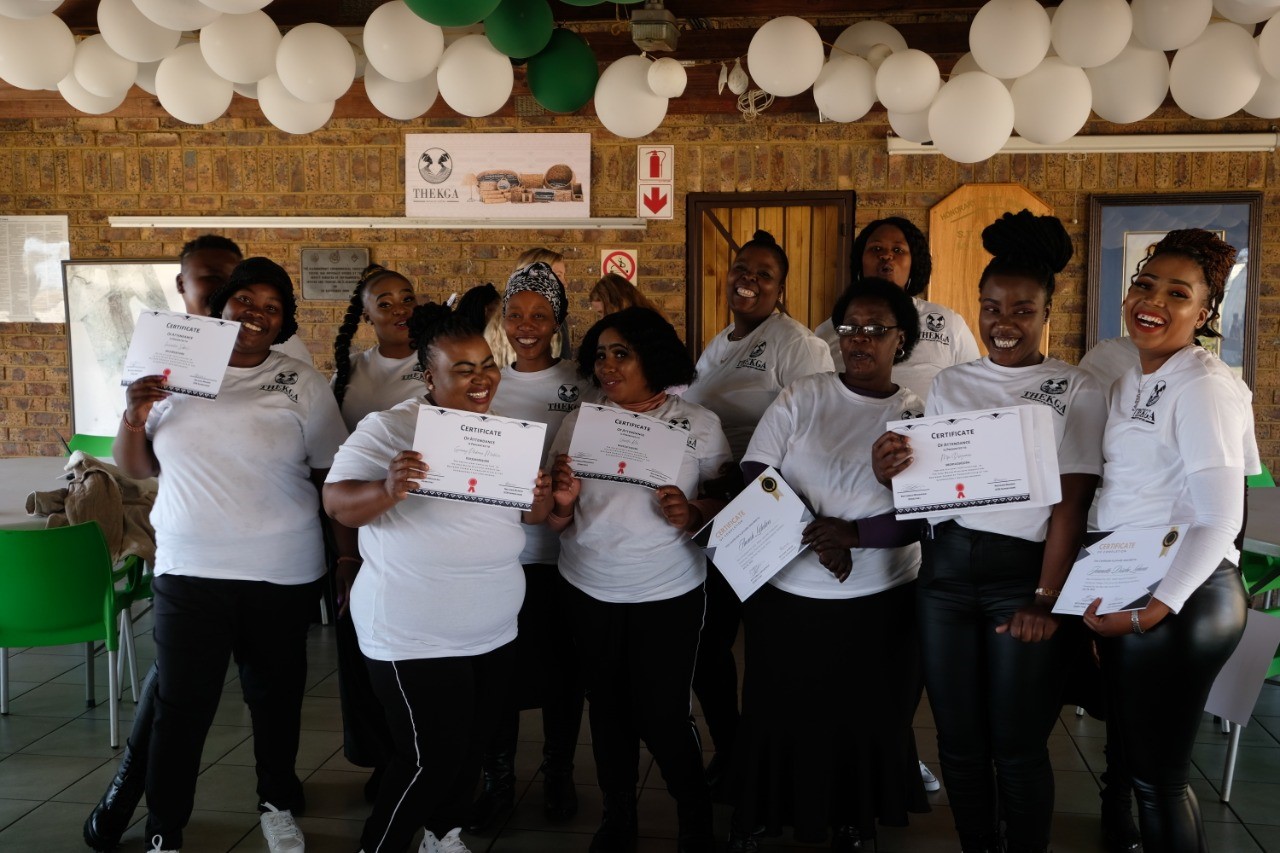
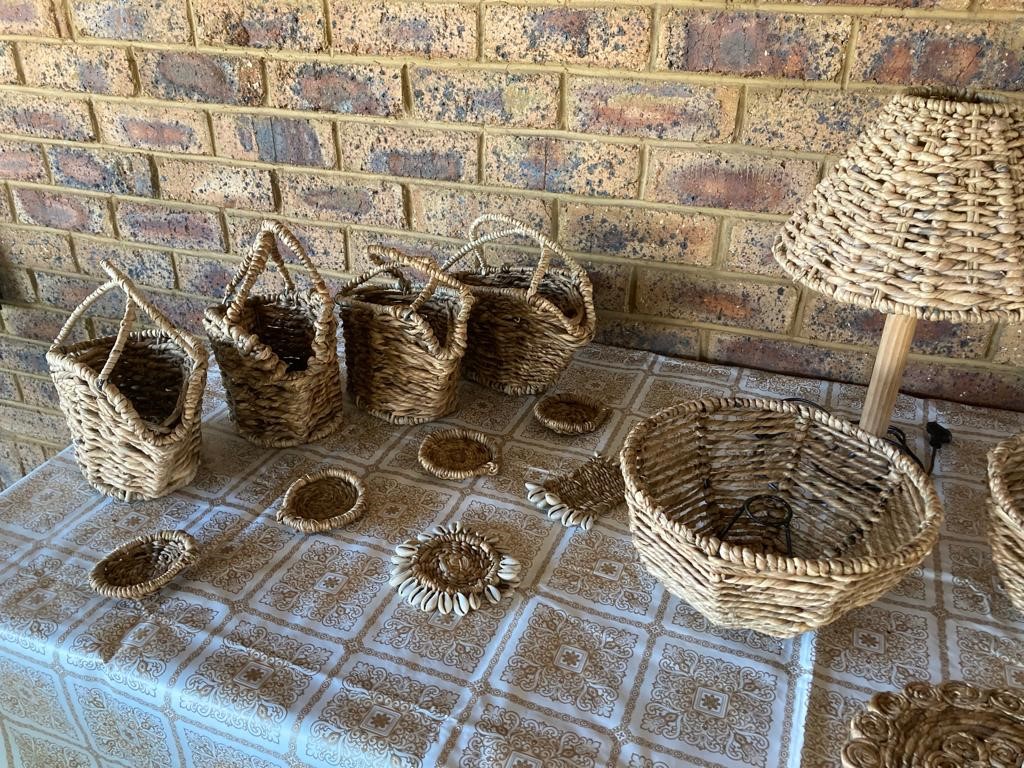
June 2022
A big step for Blue Deal Crocodile River: signing of the Memorandum of Understanding
On the 8th of June 2022 all partners involved in the Blue Deal Crocodile River Partnership in South Africa signed a Memorandum of Understanding. They set out their joint commitments to work together in the province of Mpumalanga towards the goal of improved water quality in the important regional and international Crocodile River.
The list of national and local partners involved is impressive, including national, provincial and local tiers of government mandated with Integrated Water Resource Management and Water & Sanitation Services delivery. They, and the Dutch Water Authorities, all subscribe to the important learning objective of the partnership: to improve the operation and maintenance of six specially targeted municipal wastewater treatment plants: two in City of Mbombela, two in Nkomazi Local Municipality and two in Emakhazeni Municipalities Local Municipality.
This will improve the water quality of the discharge to being legally compliant, and thereby reduce the negative impact on the Crocodile River catchment from up- to downstream. Importantly, the Partner learnings arising from these six targeted wastewater treatment plants will be shared across the Partners with a “horizontal learning” knock on affect. Almost 1.45 million people living in and around the river catchment will benefit from this. It will further result in improvement of the eco-system.
Read more about improving the water quality of the Crocodile River and the partners involved in this folder Improvement of Water Quality of the Crocodile River
October 2022
Blue Deal Vredefort Dome: signing of the Memorandum of Understanding
On the 1st of October 2021 the partners of the Blue Deal Partnership Vredefort Dome in South Africa signed the local project Memorandum of Understanding in which they formalised their commitment to work together to contribute to improve the water quality of the Vaal River. This signing, hosted by Ngwathe Local Municipality of the Free State Province, was the first local project Memorandum of Understanding that was signed within the Blue Deal South Africa programme.
All the partners involved confirmed in their signing their commitment to contribute towards the objectives of the Blue Deal Partnership Vredefort Dome: to improve the water quality of the Vaal River in the unique UNESCO recognised Vredefort Dome Heritage Site. The project includes optimisation of the operation the Parys Waste Water Treatment plant including capacitation of the operators, addressing of performance and equipment short comings identified via the Green Drop Process and addressing the broader sanitation challenges identified via an SFD (so-called Shit Flow Diagramme).
Building on the progress of Phase 1 of the Blue Deal Partnership, the ultimate outcome of the Partnership (running till 2030), will be an improved water quality of the Vaal River for the 50,000 inhabitants of the Parys area, the natural heritage site of the Vredefort Dome and the related Local Economic Development opportunities. The downstream population will also
benefit from the improved quality of the Vaal as a reliable source for the water services.
Read more about improving the water quality of the Vaal River, the partners involved and the key activities in this folder Improvement of Water Quality of the Vaal River.
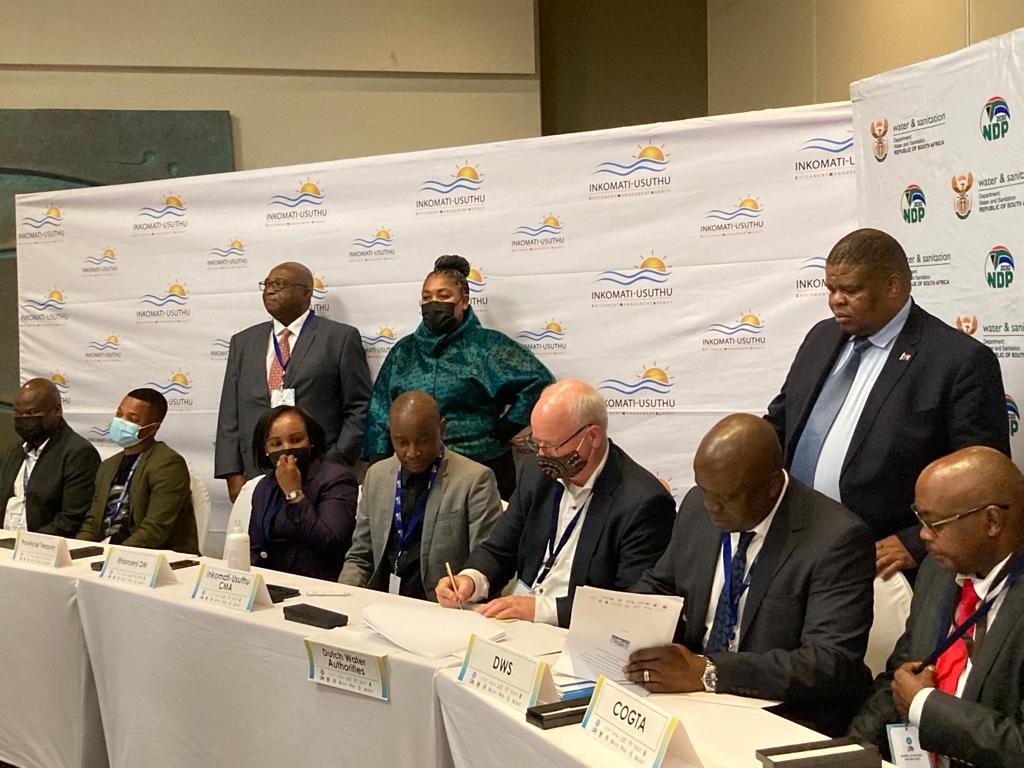
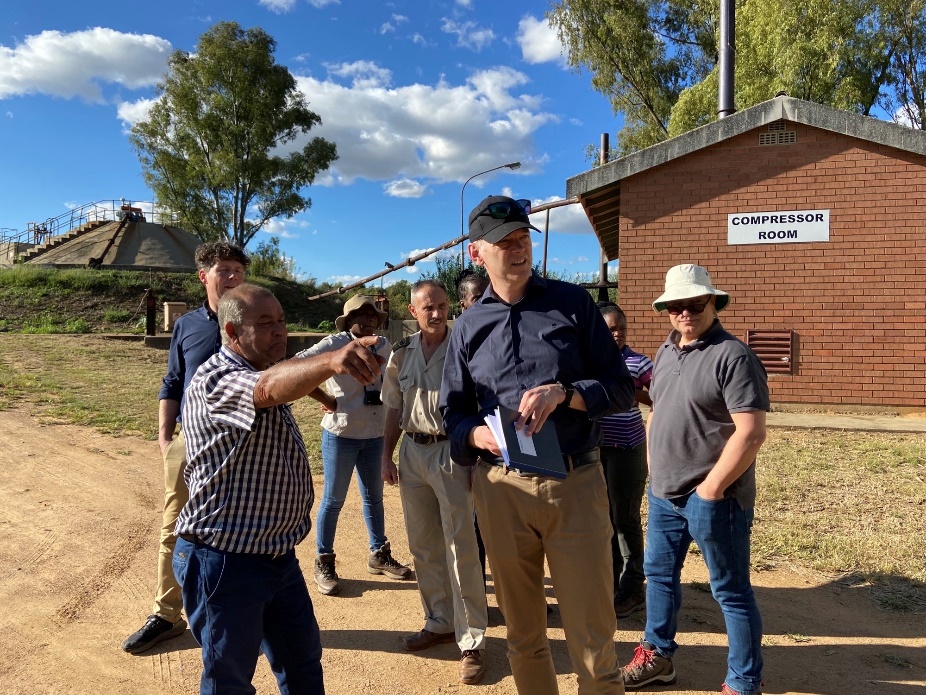
Visit of the the waste water treatment works; Parys, Ngwathe municipality.
|